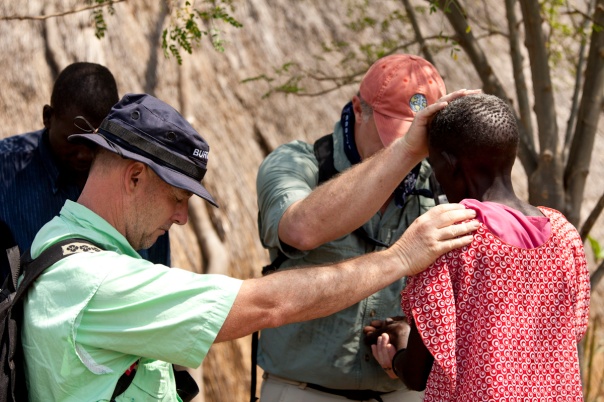When I was a kid, I had an eccentric uncle. He was an inventor, and had a lot of social quirks about him. I think a lot of these quirks came from some of the things he’d had to endure. You see, during World War 2, he’d been a pacifist, and since he would not fight, he was forced instead to do body counts after battle in the European theater.
One day he showed me a belt buckle he’d taken off a dead German soldier. It was pewter colored, and had the swastika in the center of that. Written along the top edge were the words, “Gott mit uns.” (God with us) in German.
Even at that young age, it was a shocking thing to see. How could the Nazis think, or wish, or even say that God was with them?
Well, it’s very easy to look back in history and ask how they could do that, but the fact is, as a church we do the very same thing today, though I will say generally not in such an obvious and glaring way.
I’d like to go to the book of judges where there’s an interesting story. Joshua is moving his armies through Canan, and he looks up and sees a man who he takes to be a foreign envoy.
“And it came to pass, when Joshua was by Jericho, that he lifted his eyes and looked, and behold, a Man stood opposite him with His sword drawn in His hand. And Joshua went to Him and said to Him, “Are You for us or for our adversaries?”
So He said, “No, but as Commander of the army of the Lord I have now come.”
And Joshua fell on his face to the earth and worshiped, and said to Him, “What does my Lord say to His servant?”
It’s interesting to me that Joshua asks, “are you for us or against us?” And the angel answers “no”. In other words, you are asking the wrong question. But we ask the same question of God, as if we have any authority to ask it.
The question should be, “Have I found favor in your sight?” Or, “how can I serve you?” Or so many other questions that recognize who is in authority, that being not us. We need to stop asking if God is on our side and start making sure we are on his side.
It is possible to know exactly how to be on God’s side, but it requires commitment and study and being open to what the Holy Spirit would teach us. The bible is full of the commands of God. So many in fact that I wouldn’t know where to start.
The problem is that the American church in particular has given up on knowing what the scriptures say. And one of those scriptures says, “My people are destroyed for lack of knowledge. Because you have rejected knowledge, I also will reject you from being priest for Me; Because you have forgotten the law of your God, I also will forget your children.” Hosea 4:6
You see, without knowledge there is no possibility for wisdom. Without knowledge there is no possibility for discernment. Without knowledge, there is no possibility to know the will or the character of God. In short order we find ourselves making God to be anything we want him to be, so long as he’s on our side, and the next thing you know, we’re wearing belt buckles emblazoned with “Gott mit uns.”
So what do we do about this? Ephesians 4 says, “And He Himself gave some to be apostles, some prophets, some evangelists, and some pastors and teachers, for the equipping of the saints for the work of ministry, for the edifying of the body of Christ, till we all come to the unity of the faith and of the knowledge of the Son of God, to a perfect man, to the measure of the stature of the fullness of Christ; that we should no longer be children, tossed to and fro and carried about with every wind of doctrine, by the trickery of men, in the cunning craftiness of deceitful plotting, but, speaking the truth in love, may grow up in all things into Him who is the head—Christ— from whom the whole body, joined and knit together by what every joint supplies, according to the effective working by which every part does its share, causes growth of the body for the edifying of itself in love.”
We must put the knowledge of who God is back into the churches, both through the study and memorization of the Word, and also through people who possess knowledge and wisdom and discernment to have the willingness to disciple others.
Jesus didn’t keep his knowledge to himself. He taught large crowds of people, while at the same time walking daily with twelve men that he could train to teach others. This is what we need to get back to.
It’s very easy to read something like this and say, “yes, those people need to do something about this.” But if you are part of the church, this is for You! There aren’t players and those who get to sit on the bench in the Kingdom of God. There are no stadium seats. As it says in the book of Hebrews, “Let us lay aside every weight, and the sin which so easily ensnares us, and let us run with endurance the race that is set before us, looking unto Jesus, the author and finisher of our faith, who for the joy that was set before Him endured the cross, despising the shame, and has sat down at the right hand of the throne of God.”









